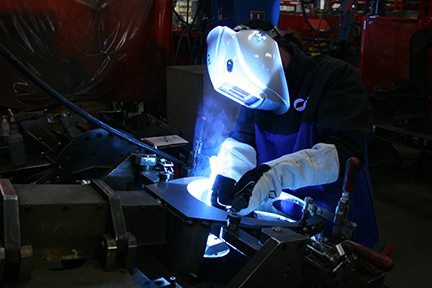The Benefits of Metal-Cored Welding Wire
Metal-cored wire can bring key benefits to your welding operation compared to using solid wire — namely, improved productivity, higher weld quality, and lower costs.
So how is this achieved?
1. With the same welding wire size at the same operating parameters (amperage), metal-cored wire typically has a higher deposition rate, resulting in faster travel speeds for the same size weld.
2. Metal-cored wire welds have higher tolerance for mill scale, oil, and dirt on the base material, often meaning that cleaning operations can be avoided. This helps manufacturers reduce labor costs and optimize productivity.
3. The wire produces minimal spatter, so there is no need to apply anti-spatter and you can reduce post-weld grinding and cleanup.
4. By eliminating pre- and post-weld activities, you can reallocate labor to other areas of your welding operation where welders can help increase throughput.
5. Metal-cored wire provides good gap bridging and weld fusion to reduce the need for rework.
6. Metal-cored wire is easy to use, so it can simplify training for new welders. The welding technique is very similar to solid wires.
Overall, metal-cored wire produces high weld quality and can yield up to a 30 percent increase in productivity. Faster cycle times mean you can get more parts out the door and gain a better bottom line.
Learn about the real-world benefits of metal-cored wire.
This article is the second in a three-part series discussing metal-cored wire, its benefits and how to convert to this filler metal technology. Read Article 1, Is Metal-Cored Welding Wire Right for You? and Article 3, How to Convert to Metal-Cored Welding Wire.



